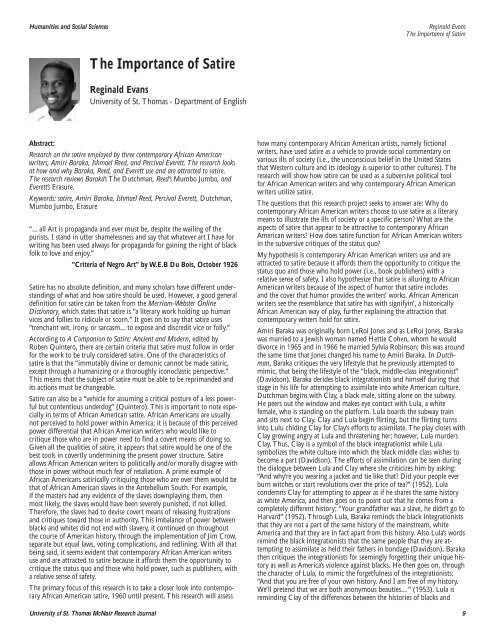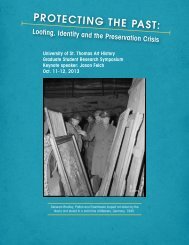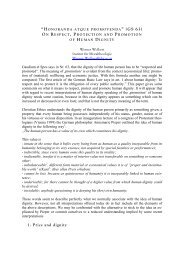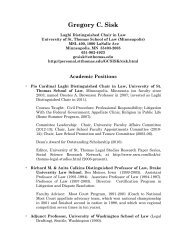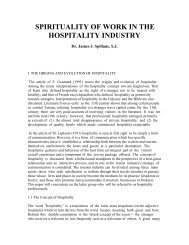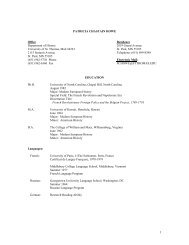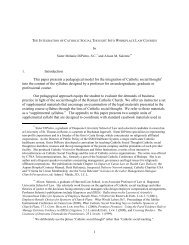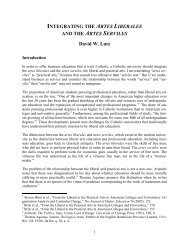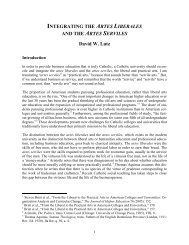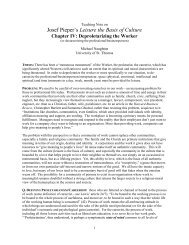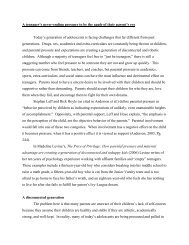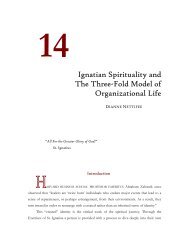McNair Research Journal - University of St. Thomas
McNair Research Journal - University of St. Thomas
McNair Research Journal - University of St. Thomas
You also want an ePaper? Increase the reach of your titles
YUMPU automatically turns print PDFs into web optimized ePapers that Google loves.
Humanities and Social Sciences<br />
The Importance <strong>of</strong> Satire<br />
Reginald Evans<br />
<strong>University</strong> <strong>of</strong> <strong>St</strong>. <strong>Thomas</strong> - Department <strong>of</strong> English<br />
Abstract:<br />
<strong>Research</strong> on the satire employed by three contemporary African American<br />
writers, Amiri Baraka, Ishmael Reed, and Percival Everett. The research looks<br />
at how and why Baraka, Reed, and Everett use and are attracted to satire.<br />
The research reviews Baraka’s The Dutchman, Reed’s Mumbo Jumbo, and<br />
Everett’s Erasure.<br />
Keywords: satire, Amiri Baraka, Ishmael Reed, Percival Everett, Dutchman,<br />
Mumbo Jumbo, Erasure<br />
“…all Art is propaganda and ever must be, despite the wailing <strong>of</strong> the<br />
purists. I stand in utter shamelessness and say that whatever art I have for<br />
writing has been used always for propaganda for gaining the right <strong>of</strong> black<br />
folk to love and enjoy.”<br />
“Criteria <strong>of</strong> Negro Art” by W.E.B Du Bois, October 1926<br />
Satire has no absolute definition, and many scholars have different understandings<br />
<strong>of</strong> what and how satire should be used. However, a good general<br />
definition for satire can be taken from the Merriam-Webster Online<br />
Dictionary, which states that satire is “a literary work holding up human<br />
vices and follies to ridicule or scorn.” It goes on to say that satire uses<br />
“trenchant wit, irony, or sarcasm…to expose and discredit vice or folly.”<br />
According to A Companion to Satire: Ancient and Modern, edited by<br />
Ruben Quintero, there are certain criteria that satire must follow in order<br />
for the work to be truly considered satire. One <strong>of</strong> the characteristics <strong>of</strong><br />
satire is that the “immutably divine or demonic cannot be made satiric,<br />
except through a humanizing or a thoroughly iconoclastic perspective.”<br />
This means that the subject <strong>of</strong> satire must be able to be reprimanded and<br />
its actions must be changeable.<br />
Satire can also be a “vehicle for assuming a critical posture <strong>of</strong> a less powerful<br />
but contentious underdog” (Quintero). This is important to note especially<br />
in terms <strong>of</strong> African American satire. African Americans are usually<br />
not perceived to hold power within America; it is because <strong>of</strong> this perceived<br />
power differential that African American writers who would like to<br />
critique those who are in power need to find a covert means <strong>of</strong> doing so.<br />
Given all the qualities <strong>of</strong> satire, it appears that satire would be one <strong>of</strong> the<br />
best tools in covertly undermining the present power structure. Satire<br />
allows African American writers to politically and/or morally disagree with<br />
those in power without much fear <strong>of</strong> retaliation. A prime example <strong>of</strong><br />
African Americans satirically critiquing those who are over them would be<br />
that <strong>of</strong> African American slaves in the Antebellum South. For example,<br />
if the masters had any evidence <strong>of</strong> the slaves downplaying them, then<br />
most likely, the slaves would have been severely punished, if not killed.<br />
Therefore, the slaves had to devise covert means <strong>of</strong> releasing frustrations<br />
and critiques toward those in authority. This imbalance <strong>of</strong> power between<br />
blacks and whites did not end with slavery, it continued on throughout<br />
the course <strong>of</strong> American history, through the implementation <strong>of</strong> Jim Crow,<br />
separate but equal laws, voting complications, and redlining. With all that<br />
being said, it seems evident that contemporary African American writers<br />
use and are attracted to satire because it affords them the opportunity to<br />
critique the status quo and those who hold power, such as publishers, with<br />
a relative sense <strong>of</strong> safety.<br />
The primary focus <strong>of</strong> this research is to take a closer look into contemporary<br />
African American satire, 1960 until present. This research will assess<br />
<strong>University</strong> <strong>of</strong> <strong>St</strong>. <strong>Thomas</strong> <strong>McNair</strong> <strong>Research</strong> <strong>Journal</strong><br />
Reginald Evans<br />
The Importance <strong>of</strong> Satire<br />
how many contemporary African American artists, namely fictional<br />
writers, have used satire as a vehicle to provide social commentary on<br />
various ills <strong>of</strong> society (i.e., the unconscious belief in the United <strong>St</strong>ates<br />
that Western culture and its ideology is superior to other cultures). The<br />
research will show how satire can be used as a subversive political tool<br />
for African American writers and why contemporary African American<br />
writers utilize satire.<br />
The questions that this research project seeks to answer are: Why do<br />
contemporary African American writers choose to use satire as a literary<br />
means to illustrate the ills <strong>of</strong> society or a specific person? What are the<br />
aspects <strong>of</strong> satire that appear to be attractive to contemporary African<br />
American writers? How does satire function for African American writers<br />
in the subversive critiques <strong>of</strong> the status quo?<br />
My hypothesis is contemporary African American writers use and are<br />
attracted to satire because it affords them the opportunity to critique the<br />
status quo and those who hold power (i.e., book publishers) with a<br />
relative sense <strong>of</strong> safety. I also hypothesize that satire is alluring to African<br />
American writers because <strong>of</strong> the aspect <strong>of</strong> humor that satire includes<br />
and the cover that humor provides the writers’ works. African American<br />
writers see the resemblance that satire has with signifyin’, a historically<br />
African American way <strong>of</strong> play, further explaining the attraction that<br />
contemporary writers hold for satire.<br />
Amiri Baraka was originally born LeRoi Jones and as LeRoi Jones, Baraka<br />
was married to a Jewish woman named Hettie Cohen, whom he would<br />
divorce in 1965 and in 1966 he married Sylvia Robinson; this was around<br />
the same time that Jones changed his name to Amiri Baraka. In Dutchman,<br />
Baraka critiques the very lifestyle that he previously attempted to<br />
mimic, that being the lifestyle <strong>of</strong> the “black, middle-class integrationist”<br />
(Davidson). Baraka derides black integrationists and himself during that<br />
stage in his life for attempting to assimilate into white American culture.<br />
Dutchman begins with Clay, a black male, sitting alone on the subway.<br />
He peers out the window and makes eye contact with Lula, a white<br />
female, who is standing on the platform. Lula boards the subway train<br />
and sits next to Clay. Clay and Lula begin flirting, but the flirting turns<br />
into Lulu chiding Clay for Clay’s efforts to assimilate. The play closes with<br />
Clay growing angry at Lula and threatening her; however, Lula murders<br />
Clay. Thus, Clay is a symbol <strong>of</strong> the black integrationist while Lula<br />
symbolizes the white culture into which the black middle class wishes to<br />
become a part (Davidson). The efforts <strong>of</strong> assimilation can be seen during<br />
the dialogue between Lula and Clay where she criticizes him by asking:<br />
“And why’re you wearing a jacket and tie like that? Did your people ever<br />
burn witches or start revolutions over the price <strong>of</strong> tea?” (1952). Lula<br />
condemns Clay for attempting to appear as if he shares the same history<br />
as white America, and then goes on to point out that he comes from a<br />
completely different history: “Your grandfather was a slave, he didn’t go to<br />
Harvard” (1952). Through Lula, Baraka reminds the black integrationists<br />
that they are not a part <strong>of</strong> the same history <strong>of</strong> the mainstream, white<br />
America and that they are in fact apart from this history. Also Lula’s words<br />
remind the black integrationists that the same people that they are attempting<br />
to assimilate as held their fathers in bondage (Davidson). Baraka<br />
then critiques the integrationists for seemingly forgetting their unique history<br />
as well as America’s violence against blacks. He then goes on, through<br />
the character <strong>of</strong> Lula, to mimic the forgetfulness <strong>of</strong> the integrationists:<br />
“And that you are free <strong>of</strong> your own history. And I am free <strong>of</strong> my history.<br />
We’ll pretend that we are both anonymous beauties…” (1953). Lula is<br />
reminding Clay <strong>of</strong> the differences between the histories <strong>of</strong> blacks and<br />
9


